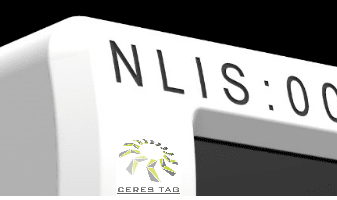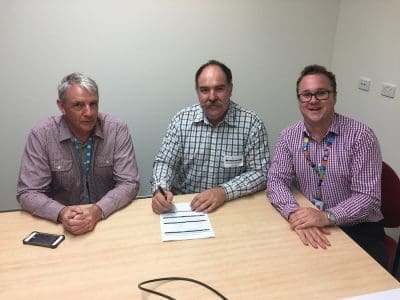A new smart ear tag designed to give cattle producers more flexibility over grazing management, to locate livestock remotely and alert them to stock theft has moved a step closer to commercialisation this week.
Ceres Tag Pty Ltd, which is developing the new generation smart ear tag for the red meat industry as part of an R&D project co-funded by the MLA Donor Company, announced a new collaboration agreement with the CSIRO today.
Ceres Tag’s smart ear tag features geo-location for greater traceability and provenance, as well as movement monitoring for land improvement and health monitoring for biosecurity purposes. It will also provide a platform for other possible applications in future.
The company says the aim of the technology is help livestock producers to reduce operating costs, increase operational efficiency and additional financing opportunities through better management of livestock through data.
Ceres Tag CEO David Smith said the company was thrilled to be collaborating with the CSIRO and MLA Donor Company to develop the technology.
“Our goal is to start commercialisation of a smart ear tag for livestock in the next two to three years,” he said.
“We recognised that the challenges on our own property with livestock management and handling were the same facing most other livestock producers. We felt there was a real need for a solution, so we put our hand up to tackle the challenge.”
 CSIRO Group Leader in Livestock Systems, Dr Ed Charmley, said: “We have been working on the concept of a smart ear tag for livestock for a few years now. Information can be translated into knowledge to improve management of both livestock and the paddock. The smart ear tag can give us that information to improve the economic and environmental sustainability of the livestock industry.
CSIRO Group Leader in Livestock Systems, Dr Ed Charmley, said: “We have been working on the concept of a smart ear tag for livestock for a few years now. Information can be translated into knowledge to improve management of both livestock and the paddock. The smart ear tag can give us that information to improve the economic and environmental sustainability of the livestock industry.
“By bringing together our livestock know-how and deep technology expertise from Data61, CSIRO’s data science and technology business unit, we are collaborating with Ceres Tag to develop a high quality product for the red meat industry. This is an opportunity to help transform Australia’s strong agriculture industry as the data economy takes hold and enable Australian businesses to capture the opportunity at hand.”
Ceres Tag is being developed as an NLIS (National Livestock Identification System) compliant smart ear tag targeted to last the life of the animal.
Mr Smith said Ceres Tag is in discussions with existing management software providers to process data from its smart tags to ensure they are simple to use and easy to understand for all stakeholders involved.

Signing the Ceres Tag Collaboration Agreement: (left) Dr Ed Charmley of CSIRO (centre) David Smith CEO, Ceres Tag and (right) Gavin Purtell of CSIRO.
“The idea is that this will lead to a more rapid adoption of the technology and benefit the entire livestock industry,” he said.
“Another potential benefit is that the finance industry will recognise the lower risk associated with knowing exactly where animals are and how many there are, which could translate into livestock being more widely used as an asset class.”
Initial testing will be conducted at the research level, but the ear tags will be trialed with livestock producers within a year.
For more information please go to www.cerestag.com.




If all you did with the new tags was make them stay in and continue to read for the life of the animal we’d be a long way in front of where we are now with electronic ear tags.
Congratulations Ceres tags on your effort. As a producer who has been involved with industry through Cattlemen’s Union, Agforce, Regional Beef Research Groups MLA producer group NABRAC it is great to see a tech group going out there into the future.
If beef producers are still locked in the past production systems current tech’ does not try to carry them forward. I see Ceres Tags as being able to supply the data to take producers into the future.
When we think of advancements of the last decade or so, remote water monitoring, walk over weighing, automated data collection in the yards along side other developments, I see this as a big step forward.
Looking forward to catching the 2 legged dingos taking my cattle for a walk down the road.
For the benefit of younger readers, southern Queensland beef producer Jim Cross was one of the early hosts of electronic ID producer demonstration trials back in the 1990s, long before the advent of NLIS. Editor
Congratulations for this step forward.
If going to the trouble of making this, please forget about lasting one animals lifetime; make it re-use-able so it lasts many animals lifetimes !
The article seems light-on about actually how it works, and what tools are required to make it work, but is full of theoretical benefits. If geo-location ability was so easy and cheap to do that it can be incorporated into a $3 ear tag, wouldn’t every car and device be fitted with in case it gets stolen and it could be easily recovered?
Someone should stick a tag reader on a drone and go read stray cattle if they are fitted with tags in the first place.
While NLIS tag retention has improved a bit, tag loss is still a major problem after years of exposure to the elements. I have personally seen 50% fallen out after five years. Be nice if research could be put into that, as a fallen out tag renders the whole NLIS system very flawed as whole of life traceability is often lost for cattle that have changed PIC’s. Not that I think the NLIS system is really necessary in Australia as it is such a weak but expensive system by it’s very design.